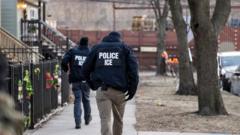A recent court ruling has spotlighted a significant immigration issue, as a federal judge, Terry Doughty, declared that a two-year-old US citizen, referred to as VML, may have been deported to Honduras without receiving adequate legal process. The legal proceedings come in light of a rise in detentions of undocumented immigrants under the renewed immigration enforcement policies of the Trump administration.
Judge Questions Deportation of US Citizen Toddler Without Due Process

Judge Questions Deportation of US Citizen Toddler Without Due Process
A federal judge raises concerns regarding the deportation of a US citizen child amid heightened immigration enforcement.
Judge Doughty expressed "strong suspicion" that VML was deported alongside her mother and sister following their apprehension during a routine visit to an immigration office in New Orleans on April 22. The child's citizenship has raised significant legal questions, especially since the U.S. Department of Homeland Security stated that the mother had opted to take her children with her back to Honduras. The judge attempted to contact the mother to clarify the situation, only to be informed through a government lawyer that she and VML had already been released in Honduras.
The immigration statuses of the child's mother, father, and sister are currently uncertain, but the judge noted, “It is illegal and unconstitutional to deport, detain for deportation, or recommend deportation of a US citizen.” A hearing focusing on the case has been scheduled for May 19, aimed at addressing potential violations of due process.
Additionally, the father of VML has taken steps to gain temporary custody of the children, which has faced opposition from Immigration and Customs Enforcement (ICE). In a similar case reported from Florida, a Cuban mother and her US citizen husband were reportedly removed to Cuba shortly after being detained at a scheduled immigration appointment, raising further concerns about the treatment of families within the immigration system.
As detentions surge since January 20, 2023, under the leadership of President Trump, criticism of the administration’s hardline policies continues to grow, facing various legal challenges, including a high-profile case involving the mistaken deportation of El Salvador national Kilmar Ábrego García. The Supreme Court has ruled in favor of facilitating Mr. Ábrego García's return, amidst claims of his association with gangs being denied by family and legal representatives.
These developments underscore the ongoing complexities of U.S. immigration policy and the vital legal protections surrounding citizenship rights.
The immigration statuses of the child's mother, father, and sister are currently uncertain, but the judge noted, “It is illegal and unconstitutional to deport, detain for deportation, or recommend deportation of a US citizen.” A hearing focusing on the case has been scheduled for May 19, aimed at addressing potential violations of due process.
Additionally, the father of VML has taken steps to gain temporary custody of the children, which has faced opposition from Immigration and Customs Enforcement (ICE). In a similar case reported from Florida, a Cuban mother and her US citizen husband were reportedly removed to Cuba shortly after being detained at a scheduled immigration appointment, raising further concerns about the treatment of families within the immigration system.
As detentions surge since January 20, 2023, under the leadership of President Trump, criticism of the administration’s hardline policies continues to grow, facing various legal challenges, including a high-profile case involving the mistaken deportation of El Salvador national Kilmar Ábrego García. The Supreme Court has ruled in favor of facilitating Mr. Ábrego García's return, amidst claims of his association with gangs being denied by family and legal representatives.
These developments underscore the ongoing complexities of U.S. immigration policy and the vital legal protections surrounding citizenship rights.





















